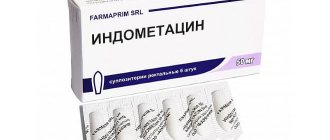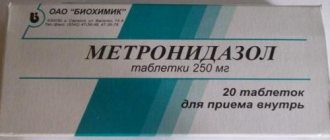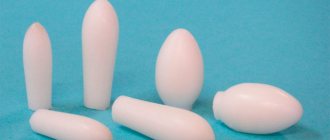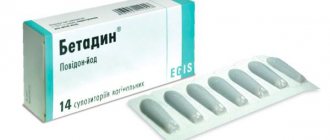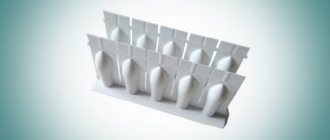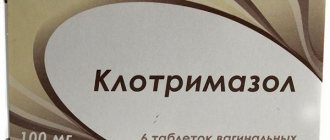With drugs
To normalize the environment of the genital organs, as well as increase the body’s protective abilities, doctors prescribe vaginal suppositories with lactic acid to patients.
Depending on the characteristics of the drug, suppositories are indicated for administration in the morning or evening. Thanks to such drugs, the likelihood of relapse of recent pathology can be reduced by more than ten times. To restore the microflora, the following female vaginal suppositories are used:
- Vaginorm C. Suppositories normalize the level of acidity, and due to the content of ascorbic acid in them, pathogenic microflora is suppressed.
- Femilex. The action of the drug is aimed at suppressing the vital activity of foreign microorganisms. Due to the main component (lactic acid), the development of fungi is prevented when the environment becomes alkalized.
- Lactobacterin. Doctors prescribe suppositories to restore the acid-base balance of the vaginal environment after a course of treatment for thrush has been completed.
For pain relief and good warming of the reproductive organs, suppositories with Demixide are used in gynecology
You need to make them yourself, but you should be extremely careful when using them, since a high concentration of the active component can cause a burn. The attending physician should tell you how to prepare the medicine.
Vaginal suppositories with interferon are prescribed to combat chlamydia, toxoplasmosis, mycoplasmosis, ureaplasmosis, herpes, trichomoniasis, vaginal candidiasis, cervical erosion, cervicitis, adnexitis, metritis and salpingitis. The most famous representative, and also quite effective, is Genferon, which also improves immunity.
Vaginal suppositories Genferon
Vaginal suppositories with lidocaine or novocaine are prescribed in gynecology to eliminate pain after childbirth, surgery or abortion. For medicinal purposes, it is also practiced to introduce drugs with a similar composition into the therapeutic complex, i.e. For example, Neo Penotran suppositories are designed to combat infectious diseases of the genital organs.
Suppositories with hyaluronic acid are used in gynecology to eliminate conditions such as vaginal dryness, as they have a moisturizing effect.
When used correctly, women have the opportunity to improve the process of tissue regeneration, which is especially important for diagnosed cervical erosion
Vaginal suppositories with hyaluronic acid help to increase the proliferation of the organ, thereby improving the flow of nutrients to them, and also normalizing blood circulation. Most often, doctors prescribe Lidaz and Revitax suppositories.
If it is necessary to eliminate pathogenic microflora, doctors advise women to use vaginal suppositories with vitamin C. They also normalize the acidity of the environment and prevent the development of fungal infections. But to eliminate dryness during menopause, vaginal suppositories with vitamin E are more suitable, which are better to do yourself.
Let's consider several more types of suppositories that women can use for various pathologies in the genital area:
- Candles with beaver stream. In gynecology they are used against thrush, candidiasis, colpitis, cystitis and pain in the lower abdomen.
- Candles with badger fat. In gynecology it is used as an antiseptic component, on the basis of which tampons are made.
- Candles with Chlorophyllipt. In gynecology, herbal medicine is part of complex therapy for inflammation, colpitis, endometritis, cervical erosion, and endocervicitis.
- Candles with Vishnevsky ointment. In gynecology, they are intended to eliminate many diseases of the genital organs of an inflammatory nature. The medicine is made independently and may consist of several components.
- Suppositories with Ciprofloxacin. In gynecology, they are used as part of independent or complex therapy aimed at relieving inflammatory processes.
- Vaginal suppositories with estrogen are intended for women during menopause who need to compensate for the lack of the main female hormone and eliminate menopausal symptoms.
As you can see, the list of suppositories that are used in gynecology is quite wide. Each drug option is intended for its own purposes, so it is not recommended to select medications on your own; it is better to consult a doctor who will make the correct diagnosis and suggest a therapeutic regimen.
Treatment regimen
To treat inflammation, you will need antibacterial drugs, antiseptics, agents that increase general and local immunity, and drugs that restore normal vaginal flora.
For inflammation caused by fungi, antifungal drugs will be needed. To increase the efficiency of the hormonal system, the patient is prescribed estrogen suppositories.
The entire treatment regimen consists of sequentially passing through stages, starting from relief of inflammation to general improvement of the body. Before starting treatment, the patient undergoes an ultrasound and a blood test to determine the presence of hormones in the body.
An important place in the treatment of inflammatory processes in the uterus is given to such dosage forms as suppositories. Antibiotics in tablets for inflammation of the uterus are definitely the main therapy, but local exposure also allows you to quickly create the necessary concentration of drugs and quickly stop the inflammation.
Inflammation of the uterus can be caused by a variety of pathogens. Pathogenic flora includes chlamydia, trichomonas, human papillomavirus and herpes. Opportunistic flora include Escherichia coli, Staphylococcus aureus and other pathogens. Some of these infections are transmitted through sexual contact.
Inflammation begins from the moment when the uncontrolled growth of one or more pathogens begins. Under normal conditions, lactic acid bacteria predominate in the vagina. Inflammation also becomes possible if an imbalance occurs between normal microorganisms and opportunistic flora.
With a normal number of lactic acid bacteria, the growth of pathogens is inhibited due to the creation of unfavorable conditions for them. Therefore, upon completion of treatment with the help of special vaginal suppositories, the healthy flora of the vagina is necessarily restored.
At the initial stage of treatment, after making a diagnosis and determining the type of pathogen, antibacterial drugs are prescribed, including tablet forms and vaginal suppositories with an antimicrobial effect.
Medicine Polygynax
These are vaginal suppositories. This drug contains two antibiotics: polymyxin and neomycin. In addition to these ingredients, they also contain nystatin, an antifungal substance.
Suppositories effectively help eliminate many pathogenic microorganisms (streptococci, E. coli, ureaplasma). In addition, they are used in the treatment of fungal diseases. They perfectly treat many pathologies, including inflammation of the ovaries. Suppositories in gynecology are used to combat vaginitis, colpitis, and vulvovaginitis. Often this drug is used as a prophylactic agent before upcoming operations, childbirth, and diagnostic procedures.
Suppositories are prescribed for medicinal purposes, usually for 12 days, 1 suppository at night. If the product is used for prophylaxis, the course is reduced to 6 days.
The drug "Polygynax" is well tolerated by the body. It has a minimal number of side effects, so it extremely rarely provokes their occurrence. These may mainly be allergic manifestations
Such suppositories should be used with great caution by women who cannot tolerate soybean oil and peanuts. With long-term therapy (this is often observed when using the drug independently), microflora disturbances may occur.
Rectal method of therapy
Suppositories for inflammation of the appendages are used quite widely. They are good because they are easily absorbed and begin to quickly act on the body. They are also prescribed exclusively by the doctor based on the results of the woman’s examination.
One of the popular suppositories for the treatment of adnexitis is Hexicon. The active substance of this medication has quite strong antiseptic properties, so the medicine can fight many pathogens.
Such suppositories for adnexitis have almost no contraindications, so they are allowed to be used even by pregnant women. But it is worth noting that they can cause some side effects, for example, itching and burning in the perineum. As soon as the treatment is over, these unpleasant symptoms will immediately disappear.
Suppositories for endometriosis
Suppositories are recognized by gynecologists as one of the most convenient forms and are therefore prescribed for various gynecological pathologies.
But vaginal suppositories for endometriosis are recommended relatively infrequently, due to prolonged bleeding or regular “spotting” typical for the disease.
If such symptoms are present, medications are washed out of the vagina without providing the necessary therapeutic effect.
Rectal suppositories are prescribed for the treatment of endometriosis. They may have both anti-inflammatory and analgesic properties.
There are three formats of the medicinal product:
- vaginal - immersed deep into the vaginal tube, as close to the cervix as possible;
- rectal - inserted exclusively into the rectum;
- sticks - used for insertion into the cervix, lumen of the ureter.
The main advantage is the delivery of the medicinal component directly to the area of inflammation. The active substance penetrates into the general bloodstream 30 minutes after placing the suppository.
Hexicon
Hexicon suppositories are an anti-inflammatory agent with an antiseptic effect that helps localize the inflammatory process. The active ingredient is digluconate chlorhexidine. After the suppositories are dissolved, the microflora of the vaginal and cervical mucosa does not become disrupted.
Application regimen: 2 times a day for 10 days. If necessary, the course of therapy is repeated.
Longidaza for endometriosis
The disease is characterized by the formation of adhesions, which causes damage to the fallopian tubes. Their obstruction leads to the development of infertility or the occurrence of ectopic pregnancy.
Longidza suppositories are prescribed to destroy the formed adhesions and stop their further formation. The full course of treatment is 10 suppositories administered every other day. If necessary, therapy can be repeated three to four months after the end of the first course.
For endometriosis, these suppositories can be used for both rectal and vaginal administration. The method is determined by the attending physician.
Indomethacin
Indomethacin suppositories are another drug used in the treatment of pathological proliferation of endometrial tissues, which has an anti-inflammatory, analgesic and weak antipyretic effect.
They are inserted deep into the vagina three times a day. Course duration is a week. Indomethacin does not cause changes in local microflora, but minor bleeding may develop during treatment.
Panzerin candles
Panzerin suppositories can be used both vaginally, inserting them deep into the vagina, and rectally.
Treatment can be continued during menstruation, but during this period the suppository is administered exclusively into the rectum.
Endometriosis and pregnancy - planning features (how to prepare)
Psychological causes of endometriosis and related pathologies
Cervical pathology - list of diseases
Treatment of oophortitis with folk remedies
Application regimen: every other day at night. The drug belongs to the group of herbal remedies and does not contain hormones.
Anti-inflammatory
The cause of pain in endometriosis is prostaglandins, which are produced in large quantities in the female body. In order to suppress the process of their production, the patient is prescribed
NSAID (non-steroidal anti-inflammatory drugs) tablets (NSAIDs).
NSAID-based suppositories are used for rectal administration. The duration of the course is no more than 10 days. Prescribed in conjunction with antibiotics.
The following types of anti-inflammatory suppositories are used in gynecology:
- Voltaren;
- Diclofenac;
- Indomethacin;
- Naklofen.
With the development of the retrocervical form of endometriosis, accompanied by germination of the endometrium into the rectal mucosa, rectal suppositories with an analgesic effect are prescribed. Preparations from this group contain belladonna or papaverine.
Side effects
The drug affects the nervous system because it can enter the bloodstream. It reduces concentration, which means suppositories with belladonna extract cannot be used while driving a car.
Also, due to the ability of the drug to relax smooth muscles, it can cause the following side effects:
- painful palpitations;
- psychomotor agitation;
- deterioration of vision (will recover after discontinuation of treatment);
- dilated pupils;
- involuntary contraction of individual muscles or groups;
- dry mouth;
- urinary retention;
- constipation
As the dosage increases, nausea, vomiting and an allergic reaction in the form of rash, urticaria, itching, dizziness, photophobia, and decreased sweating may occur. These symptoms indicate an overdose of the drug. If these symptoms occur, you should go to the hospital so that doctors can clear the blood of any remaining medication.
Suppositories for the treatment of tumors, cysts and fibroids
Useful suppositories will give a good effect in the treatment of neoplasms of various etiologies. Herbal suppositories have a pronounced antitumor effect. Thanks to phytoestrogens, which are present in many suppositories, cysts that appear as a result of hormonal imbalances resolve in women. Also, the herbal remedy can be used for detected fibroids and oncology.
Suppositories stimulate the immune system, stop the growth of tumors and metastases, and reduce the size of an existing tumor. A woman needs to remember that with such diseases one should not self-medicate; suppositories, along with medications, in such cases can only be prescribed by the attending physician.
How to deal with inflammation?
Treatment of inflammation of the appendages in women is prescribed exclusively by a doctor, who is guided by examination of the patient. If the therapy is correct, then within a week you can notice positive dynamics. But this does not mean at all that the pathology has receded and treatment can be stopped.
First of all, the attending physician establishes the cause due to which the inflammatory process develops in the appendages. The treatment plan includes the destruction of pathogenic bacteria, elimination of inflammation, and strengthening of the body. It should be noted that the fight against the disease takes quite a long time, but it must be treated completely.
Thus, treatment of inflammation of the appendages in women consists of the following points:
- Patients refuse to have sex during therapy, follow nutritional rules, and ensure complete physical and moral peace.
- Taking medications. The attending physician must prescribe medications that eliminate swelling, suppress the inflammatory process, and relieve pain. Non-steroidal anti-inflammatory drugs (NSAIDs), for example, Ibuprofen, are generally recommended. Antibiotics are required for inflammation of the appendages.
- Strengthening the immune system. For this purpose, experts prescribe vitamins.
- Antiallergenic treatment. This only applies if the patient has an allergic reaction. For this purpose, antihistamines are prescribed, for example, Suprastin.
- Carrying out physiotherapeutic procedures. Such sessions make it possible to enhance the effect of drugs and relieve patients from many unpleasant symptoms of inflammation of the appendages. Treatment is carried out in conjunction with medication.
How can I replace Methyluracil suppositories? table
| Drug name | Active substance | Indications for use | Contraindications |
| Viferon (Kipferon) | interferon alpha-2b |
|
|
| Klion-D |
|
|
|
| Phytostimulin |
|
| hypersensitivity to components |
| Pyrogenal | bacterial lipopolysaccharide |
|
|
General information
Before talking about such a medicine as vaginal suppositories, what they are, it is worth understanding their principle of operation. Doctors often prescribe this treatment if a woman has inflammatory processes, infectious or viral diseases, accompanied by dryness, burning, unusual discharge and an unpleasant odor.
Suppositories used in gynecology are intended for insertion into the vaginal cavity. There, the medication gradually dissolves under the influence of body temperature, and the process of releasing the active components begins. If we look at the structure of the reproductive system, we can find out that the uterine mucosa contains a large number of blood vessels, due to which the active substance enters the systemic bloodstream within 15-20 minutes.
What do vaginal suppositories look like?
Vaginal suppositories can rightfully be called a unique dosage form, since their use results in localized treatment. That is, the medication acts exclusively on the pelvic organs, but does not affect the liver, kidneys, or gastrointestinal tract. Thanks to this, the therapy process goes better and recovery occurs faster.
Vaginal suppositories, photos of which will be presented in this article, should be inserted correctly. To do this, you should follow these recommendations:
- Before carrying out the procedure, you must thoroughly wash your hands and disinfect them;
- The suppository is administered only in a supine position with legs apart and bent at the knees;
- Vaginal suppositories are effective only when they are inserted deeply, otherwise the active components may not reach the site of the pathology;
- After administration, you need to lower your legs and lie down for about 15 minutes, which is enough for the suppository to completely dissolve.
Vaginal suppositories and tablets help in a short time to get rid of inflammatory processes, remove uncomfortable symptoms, improve the functioning of the ovaries and stabilize the functioning of the reproductive system.
Ichthyol release forms
There are two forms of ichthyol preparations. The active substance of all these drugs is called ichthammol. Ichthammol is the international nonproprietary name (INN) of the active substance of the drug, recommended by the World Health Organization. You can get the drugs in the form of suppositories and also in the form of ointments.
- Suppositories (suppositories for rectal use). 1 suppository contains 200 grams of ichthammol (ichthyol), as well as the excipient vitepsol, the basis for the suppository.
- Ointment 10%. 100 grams of ointment contains 10 grams of ichthyol and 90 grams of medical petroleum jelly.
- Ointment 20%. 100 grams of ointment contains 20 grams of ichthyol and 80 grams of medical vaseline.
There are many Russian manufacturers of the drug: Moscow Pharm.F. CJSC, Nizhpharm OJSC, Yaroslavl F.F. CJSC, DHF OJSC, Tula FF, Tverskaya FF and others.
Be careful when using counterfeit drugs made in China! Drugs manufactured in China (transcription: yushizhi or yushizhi ruangao) and marketed under the name ichthammol or ichthyol do NOT meet the definition of the active substance as defined in the European and American Pharmacopoeia.
In China, the drug is based not on oil shale, but on soybean oil. To obtain a black resin color, dyes are added. Plant-based preparations have a fundamentally different composition and completely lack the bitumen smell typical of real ichtamoll. If you are not sure that you purchased a drug with a real active substance, then check its smell.
Hexicon indications and use
Terzhinan is a vaginal tablet that contains:
- ternidazole,
- neomycin,
- nystatin,
- sodium metasulfobenzoate,
- prednisolone.
Each component has a certain powerful anti-inflammatory, anti-allergic, and anti-exudative effect. Such vaginal tablets are prescribed for vaginitis of various natures, for vaginal trichomoniasis, and as a prophylaxis for urogenital infections. Use before bedtime.
Antifungal suppositories Polygynax are primarily used in the treatment of gynecological pathologies. Combined action drug. Includes:
- antibiotic polymyxin B;
- antibiotic neomycin.
The product destroys microbes, fungal infections, and pathogenic microflora. Localizes and paralyzes all activity of pathogenic microorganisms, while destroying their membrane. The suppositories themselves are light, soft in consistency, oval in shape with a beige tint.
Has a powerful disinfectant and antiseptic effect. Copes with viruses, fungal infections and other types of pathogens of pathological infections. After vaginal insertion of the suppository, the active substance is released; when it breaks down, iodine is released, which destroys all pathogens, viruses, and fungi. Iodine cells penetrate shallowly into tissues, but due to its slow release, the therapeutic effect lasts for quite a long time.
Use for hemorrhoids
Suppositories are prescribed to the patient by a highly specialized specialist, for example, a proctologist. A preliminary examination is carried out, on the basis of which the optimal dosage and course duration are selected. There are general rules that must be followed regardless of the name of the drug:
- Before using suppositories for their intended purpose, you should take care of bowel movements. If this cannot be done naturally, then an enema will help solve the problem.
- Before inserting suppositories, make sure your hands are clean. You cannot remove candles from the contour blister with unwashed hands!
- To ensure ease of insertion of the suppository, you need to lie on your side.
- The candle is inserted into the anus to the maximum depth (the therapeutic effect depends on this). After this, the patient requires complete rest (you just need to lie down for half an hour).
- The maximum daily number of candles for input is 10 pieces, the average is 5-6.
The duration of the course and all its features are determined individually by the doctor. There is no universal treatment regimen suitable for all clinical cases.
Nonspecific vaginitis
If nonspecific vaginitis occurs, it must be treated with antibacterial suppositories, most of them have a wide spectrum of action. An alternative and addition may be an antiseptic. The most effective suppositories for treatment:
- Polygynax;
- Terzhinan;
- Meratin-combi;
- Mikozhinax;
- Hexicon;
- Betadine.
Suppositories for gardnerellosis
This disease causes changes in the properties of vaginal discharge. Occurs due to the appearance of Gandnarella bacteria in the microflora. During treatment, suppositories are used, the active substance of which is metronidazole or its analogue:
- Terzhinan;
- Klion D-100;
- Neo-penotran forte.
Suppositories for the treatment of cystitis
The disease can be acute or chronic. The disease occurs due to a cold or bacterial infection. The following suppositories can be used to treat severe chronic cases:
- Betadine;
- Hexicon;
- syntomycin suppositories;
- candles with palin;
- McMiror.
If the disease has not been started in the early stages, it can be cured by resorting to homeopathy. Candles with belladonna, chamomile, oak bark, celandine, propolis and other plant components will be effective in such a situation. Such phytosuppositories have an anti-inflammatory effect, have no side effects and kill bacteria.
Suppositories in gynecology for cervical erosion
Cervical erosions in gynecology are treated by cauterization with a laser, electrical devices or chemicals. Suppositories are used as an additional way to relieve inflammation. They are used both before and after the cauterization procedure. We list the following as the most popular:
- Hexicon;
- Polygynax;
- Livarol.
Suppositories for the treatment of endometritis and adnexitis
Endometritis, in turn, is characterized by pain in the pubic region and lower abdomen. The disease is often a consequence of operations a woman has undergone: abortion, curettage or complicated childbirth.
Antibacterial drugs are used for treatment. In addition to tablets, suppositories are also prescribed. Rectal suppositories are used, which contain non-steroidal anti-inflammatory drugs. Such drugs have antipyretic, anti-inflammatory and analgesic properties. The following list of drugs is used:
- Indomethacin;
- Movalis candles;
- Belladonna candles;
- Voltaren.
For nonspecific colpitis, suppositories are usually prescribed, the main components of which include a broad-spectrum antibacterial drug and/or an antiseptic. Good anti-inflammatory suppositories include:
- Polygynax, consists of neomycin, nystatin, polymyxin B, is prescribed 2 times a day for a period of 5 - 14 days (price 6 pcs. 280 rub., 12 pcs. 450 rub.)
- Terzhinan, a combination of ternidazole, neomycin, nystatin, prednisolone, is prescribed once a day in the evening for 10 days (price 240-400 rubles)
- Meratin-combi, consists of ornidazole, neomycin, nystatin and prednisolone, 1 suppository is administered before bedtime for 10 days
- Mikozhinax, a combination of metronidazole, chloramphenicol, dexamethasone and nystatin, duration of treatment 7 - 14 days, 1 - 2 suppositories per day are administered
- Hexicon, the main substance is chlorhexidine digluconate, course of therapy is 7 - 10 days, 1 suppository must be administered daily (price 250 rubles)
- Betadine - the active substance iodine, is prescribed twice a day for 6 - 12 days (280-350 rubles)
Anti-inflammatory suppositories for adnexitis
Drugs in this category are most often used rectally.
The most effective anti-inflammatory suppositories:
Movalis is a drug from the NSAID group, incompatible with some antibacterial agents;
Indomethacin is the most effective suppository, the effect is felt after the first administration, they require an individual approach, as they have side effects;
Diclofenac is an analogue of Indomethacin with slightly less effectiveness and is contraindicated in women suffering from hypertension.
The drug Pimafucin indications and use
Pimafucin - the active substance - natamycin, is a macrolide antibiotic of the polyene series. Used in the treatment of vulvovaginal candidiasis. It is inserted into the vagina in a supine position 1 time - in the evening, before bedtime. The doctor prescribes the course of treatment individually, on average it lasts up to 6 days.
Hexicon - fights infections and harmful bacteria, localizes inflammation. Chlorhexidine bigluconate is an antiseptic. Suppositories, when absorbed, do not disturb the microflora of the mucous membrane, “work” exclusively in places of fungal infections, and destroy foreign microorganisms.
Antibacterial, antiviral and antifungal suppositories
Drugs from this group are introduced into the vagina, eliminate pathogenic flora, and stop the infectious process.
Pros – effectively stop the spread of inflammation, reduce the intensity of discomfort;
Minus - they negatively affect the beneficial bacteria of the vaginal microflora.
After treatment with suppositories from this group, it is recommended to take probiotics to replenish the natural flora. At the end of therapy, it is necessary to prevent thrush with Fluconazole and Flucostat.
The most effective suppositories for the treatment of adnexitis with an antibacterial effect are Terzhinan, Betadine, Clindacin, Klion D, Polygynax.
Most often, manufacturers offer complex-action candles that are effective against bacteria, viruses and fungi simultaneously. Of particular note are ichthyol suppositories, which not only eliminate inflammation, destroy pathogens of the inflammatory process, but also restore damaged vaginal mucosa.
Each case of adnexitis requires the doctor to prescribe suppositories according to individual indications, taking into account side effects and contraindications, duration and severity of the disease.
What is ichthyol
One of these agents is ichthyol, a substance with a very complex chemical name - ammonium bitumosulfonate.
It is popularly known as “ichthyol ointment.” The word “bitumen” in the chemical name is no coincidence. Ichthyol is an active substance formed after the distillation of oil shale. That is, in its final form, this product is close in composition to oil, hence the dark, almost black color of ichthyol. If you still remember school chemistry, then you know that oil consists of a large number of different mineral rocks, as well as kerogens, which were formed many millions of years ago from bacteria, algae and wood. Bitumen or oil as a medicine? This is something new, you might think. But in fact, ichthyol has been used in medicine since the 19th century, initially it was used to treat skin diseases, as well as rheumatism and gout. At the moment, this active substance is recognized in the European and American Pharmacopoeia and is widely used both in Russia and abroad.
In addition to the more well-known ichthyol ointment, there are also ichthyol suppositories. They are often used for gynecological diseases.
Antibacterial therapy
Treatment of the uterus in women is carried out with the help of antibiotics for inflammation of the appendages. The selection of a suitable drug is carried out exclusively by the doctor. Moreover, it is based on the results of an analysis that shows the type and sensitivity of the pathogen to various active components of the drugs.
Antibacterial agents may belong to different groups. The most popular drugs are the following:
- Metronidazole. This medicine is considered mandatory for patients with inflammation of the uterine appendages. It can be prescribed in any form, be it injections, tablets, gels or rectal suppositories for inflammation of the appendages. It is generally recommended to take the tablets orally. In cases where strong therapy is needed, the woman in the gynecology department is given droppers with this drug for adnexitis.
Gels are also used to treat inflammation of the appendages. Suppositories for adnexitis are often used, as they are absorbed and act faster. Metronidazole has a strong effect on pathogenic microorganisms, so it is able to rid the patient of an infection even when other strong antibiotics are of no benefit. The product relieves inflammation well and destroys viruses. Due to its effectiveness, it has been used for many years in the treatment of adnexitis.
- Azithromycin. This drug has an excellent effect on the uterine inflammatory focus, actively destroying pathogenic bacteria. To prescribe this medicine for adnexitis, it is very important to know what type of pathogen caused the development of the disease.
Because it is ineffective to take the drug when gram-positive viruses develop in the body, since they are resistant to this medication. Azithromycin is taken orally, the dosage is prescribed by the attending physician.
- Doxycycline. This drug is also often used for inflammation of the uterine appendages. It belongs to the group of tetracyclines. This remedy is distinguished by the fact that it can act on a wide variety of bacteria. It is produced in the form of capsules. The dosage and duration of administration are prescribed by the doctor. In addition to tablets, Doxycycline is also available in the form of an injection, injected into a vein. The drug taken acts quickly, improving the condition of patients after just a few days.
- Ceftriaxone. This medication is also widely used for inflammation of the uterine appendages. It also helps with any female pathologies that are infectious in nature. Ceftriaxone is prescribed when the inflammation process is complicated by a viral infection. It goes well with other antibacterial agents. Ceftriaxone is given by injection into a vein or muscle.
- Biseptol. This drug is a combination antibiotic, available in the form of tablets or injections. It is used if the disease is caused by anaerobic gram-positive and gram-negative bacteria, chlamydia and other viruses.
What suppositories are used in gynecology
Anti-inflammatory suppositories themselves in gynecology are used only as one of the dosage forms of medications. They consist of a base that gives the candle its shape, and a medicinal component. Their characteristic feature is the ability to remain solid at room temperature and turn into liquid at body temperature. There are several types of suppositories. Thus, according to the form of administration, suppositories for inflammation in gynecology are divided into 2 groups:
- Rectal - inserted directly into the rectum, have a cone shape or the appearance of a pointed cylinder.
- Vaginal - placed in the vagina, produced in the form of balls, and come in oval shape.
In addition, anti-inflammatory suppositories used in gynecology can be divided according to the type of action:
- healing;
- antibacterial;
- antimicrobial;
- painkillers;
- antifungal;
- immunomodulatory.
Vaginal suppositories
https://youtube.com/watch?v=BMRCfOBRPnI
Anti-inflammatory vaginal suppositories are used for various types of diseases of the reproductive system. This form of medications is common due to its ease of use and rapid onset of therapeutic effect. The use of suppositories eliminates errors associated with violation of the dosage and frequency of taking the drug. Among the diseases for which vaginal suppositories are used, it is worth highlighting:
- Menstrual irregularities - an increase or decrease in the volume of menstruation, a change in the duration of the cycle, absence of menstruation.
- Inflammatory processes in the reproductive system - salpingitis, oophoritis, adnexitis, cervicitis, colpitis.
- Painful sensations in the pelvic area.
- Chronic diseases of the reproductive system.
- Sexual dysfunction.
Anti-inflammatory suppositories in gynecology have a local therapeutic effect. The medicinal component acts directly on the source of inflammation. Due to this, the effect on the stomach and liver is eliminated, as when taking tablet forms of drugs. The components of the suppository quickly penetrate the blood, and the effect of their use can be noticeable after 1 hour.
Rectal suppositories
This type of suppository is often used in the treatment of diseases of the rectum. Hemorrhoids in women are a common consequence of childbirth and pregnancy. However, suppositories can also be inserted into the rectum for diseases of the reproductive system. Rectal anti-inflammatory suppositories in gynecology are used for diseases such as:
- rectal fissures;
- colpitis;
- inflammatory processes in the intestines: Crohn's disease, ulcerative colitis;
- adnexitis;
- endometriosis.
Why do the ovaries become inflamed?
Adnexitis, oophoritis, colpitis, salpingitis are diseases in which the ovaries and fallopian tubes become inflamed. All these pathologies must be treated, because they can lead to infertility and hormonal imbalances.
There are many reasons for inflammation:
- Hypothermia . The female genital organs are vulnerable to temperature changes and often an inflammatory process occurs as a result of freezing. Cold weakens the body's defenses, increasing the risk of pathogen growth.
- Infectious diseases . Many gynecological diseases of an infectious nature cause inflammation.
- Complications after illnesssexually transmitted diseases. If chlamydia, trichomoniasis, gonorrhea, candidiasis and other pathologies are not treated, complications arise.
- Abortion is an artificial termination of pregnancy, in which the fetus is scraped out of the uterus with special instruments. They damage the epithelium and form a wound inside, which causes inflammation and pain. After an abortion, the doctor prescribes antibiotics and suppositories to disinfect and heal the walls of the uterus.
- Taking some medications changes hormonal levels and because of this, the microflora is disrupted. As a result, the occurrence of one or another inflammatory disease.
If adnexitis is not treated in a timely manner, a number of complications and side effects occur:
- infertility;
- decreased libido;
- tubo-ovarian abscess;
- chronic pelvic pain syndrome.
It is impossible to determine inflammation on your own, but it can be suspected by the following symptoms:
- pain during urination;
- bleeding or discomfort during sex;
- vaginal discharge;
- unpleasant odor;
- nagging and sharp pain in the lower abdomen.
For inflammation of the ovaries, complex therapy is prescribed, which includes taking antibacterial drugs, using rectal and vaginal suppositories with anti-inflammatory and antiseptic effects. In case of severe discomfort, the patient is additionally prescribed painkillers.

